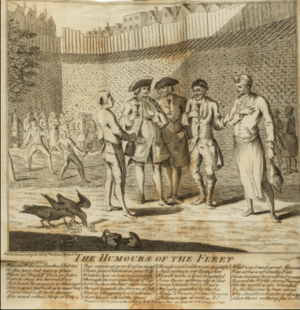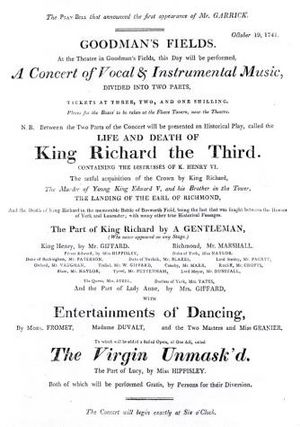William Paget (actor) facts for kids

William Paget (died 1752) was an English actor and writer in the 1700s. He performed with famous actors like David Garrick and was part of John Rich's acting group. He even acted in the first season of the Theatre Royal, Covent Garden in 1732. Besides acting, he was also a well-known tobacconist (someone who sells tobacco) on Fleet Street in London. Later in his life, he spent time in Fleet Prison because of money problems. While there, he wrote a poem called "The Humours of the Fleet". After being released, he agreed to help start the city of Halifax, Nova Scotia, in Canada, where he died in 1752.
Contents
William Paget's Acting Career
William Paget's father was a mason and architect. It is said that he helped build Buckingham House, which later became Buckingham Palace.
Early Acting Roles
In 1730, Paget played a character named Mirza in an opera called The Generous Freemason. This was one of the first operas linked to the Freemasons. It was performed during the Bartholomew Fair in London. He also acted at the Southwark Fair.
In the same year, 1730, Paget played the main role in Othello at the Haymarket theatre. He had just arrived from acting in Dublin, Ireland.
From 1730 to 1731, he joined the acting company at Theatre Royal, Drury Lane. There, he played Peachum in John Gay's famous play, Beggar's Opera. He then worked with John Rich's company from 1731 to 1733. They performed at the Lincoln's Inn Fields Theatre and later at Covent Garden. In 1733–1734, he returned to Drury Lane.
Working with Henry Giffard
After his time at Drury Lane, Paget performed at several other theatres. These included Covent Garden, the Haymarket, Lincoln's Inn Fields Theatre, and Goodman's Fields Theatre. He also acted in Richmond and Dublin. At Goodman's, he played Longman in Henry Giffard's play Pamela.
In 1736–37, Paget played the Duke of Albany in King Lear at Covent Garden.
In June 1741, Henry Giffard took a small group of actors to Ipswich for a summer season. Both Paget and the young David Garrick (who was 24 at the time) were part of this group. Paget wrote a play called A Voyage to Ipswich to open the performances. This play celebrated Admiral Edward Vernon and his victory at the Battle of Porto Bello.

In October 1741, Paget played Lord Stanley in Richard III. This performance was very important because it was when David Garrick became famous in the lead role.
In November 1741, Paget played Judge Guttle in David Garrick's own play, The Lying Valet.
In 1742, Paget played Gripe the miser in a play called Scaramouch scapin. He returned to the role of Earl of Kent in King Lear in 1742 and again in 1746. In these performances, Garrick played King Lear.
Performances with John Rich
Under John Rich's management, Paget continued to act at Covent Garden. In June 1746, he played Polonius in Hamlet. In this play, Garrick played Hamlet, and Edward Shuter played the grave digger.
In October 1746, Paget played Alonzo in Giffard's play Revenge. He also acted again in The Lying Valet and played Falstaff in Henry IV, Part 1.
In November 1748, at Covent Garden, he played Shallow in Merry Wives of Windsor. In March 1749, he played Mowbray in Henry IV at Covent Garden.
Later Life and Halifax
William Paget eventually faced serious money problems. He was held in a place called a sponging-house because of his debts. Then, he was sent to Fleet Prison in London, which was a prison for people who owed money. He was later released because of a new law passed in 1747 that helped people with debt.
The year after his release, he published his poem The Humours of the Fleet. The title was a clever play on words, referring to the prison and a popular play of the time. To escape his debts, Paget decided to move to Halifax, Nova Scotia, in Canada, along with many other English immigrants. He died soon after arriving in Halifax in 1752, leaving behind his wife and four children.
 | John T. Biggers |
 | Thomas Blackshear |
 | Mark Bradford |
 | Beverly Buchanan |

